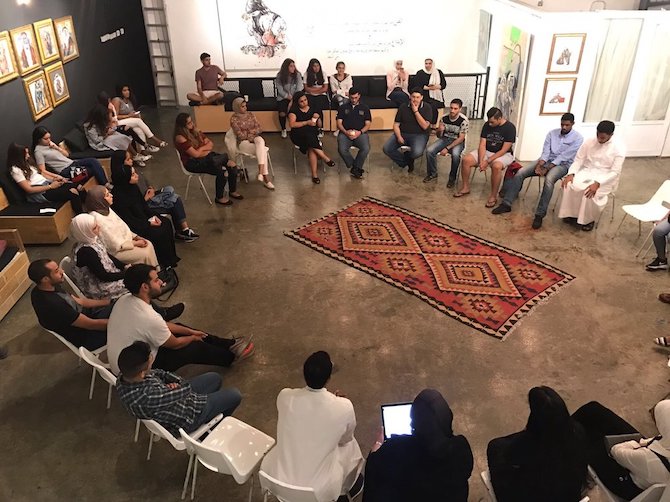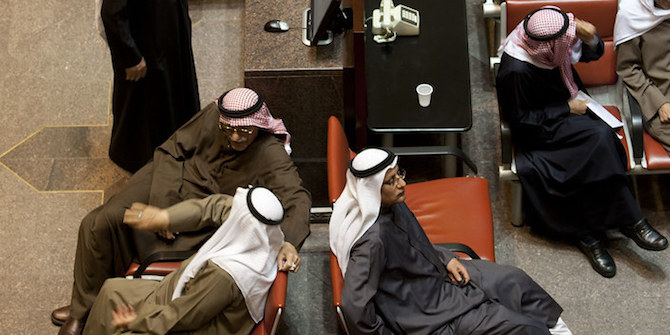by Sam Mejias & Amna Abudyak

Diwaniya has roots from the Arabic word ‘Diwan’, the Turkish ‘Divan’ and the Persian ‘Devan’. The meanings of these root words range from a collection or anthology of poetry to a higher governing council of state or a council chamber. The many definitions of the root word portray the multi-faceted significance of the ‘diwan’ in various civilizations, as well as what the diwaniya serves as in Khaleeji culture: a meeting place where ideas are exchanged, political decisions are moulded, and culture is reiterated or reimagined.
In Kuwait, the Diwaniya is centuries-old a social and political practice in which men host other men in conversations that can range from informal business dealings to political negotiations, often with the aim of generating consensus. The diwaniya can refer to both an event and a space for hosting and facilitating discussion, and has come to represent a critical element of Kuwaiti culture due to its influence on politics, business, and even family affairs. However, the diwaniya has also acted to solidify gender norms around civic participation and decision-making power, in which women, non-Kuwaitis, and young people are all routinely excluded.
And yet, due the dynamic nature of cultural change, influences of Western ideas about citizenship, and the tendency for young people to sometimes drive progressive culture shifts, it is possible to observe the beginnings of important changes to traditional diwaniya practices brought about by youth engagement. In a recent study of youth civic identities and participation at LSE and Gulf University of Science and Technology (GUST), ‘Empowering Democratic Citizenship through Education’, our research team examined the role of new, boundary-pushing diwaniyasin relation to the development of national identity and citizenship. We specifically looked at examples of grassroots, youth-led movements that have challenged and expanded the notion of the diwaniya to be more inclusive and to engage with sensitive and even controversial topics. Cross Cultural Diwaniya (CCD), Niqashna, and Hewar are three examples of a more modern iteration of the diwaniya in Kuwait, attempting to redefine it as a shared space rather than a male dominated one, as well as a place where it is possible to hold constructive discussions about topics that face potential censorship by official authorities.
In 2020, the LSE project team interviewed founders of each of these three groups to explore what draws audiences to them and how these spaces increase or inspire further engagement toward an active or inclusive citizenship that considers the rights of all peoples, regardless of background. We also conducted ethnographic observations of in-person and online diwaniya events, and analysed the public engagement strategies used by each group to attract audiences.
When holding their diwaniya events, CCD, Niqashna, and Hewar typically used either round table discussion or a debate structure format. While these reflect the traditional diwaniya approach, one of the more innovative features of the diwaniya groups was one that was forced upon them. As our study began at the beginning of the Covid-19 pandemic, we observed a clear bridging between physical and online forums, where Instagram Live and Zoom became frequently used tools for continuing to hold events once in-person venues were restricted. The use of digital tools and social media platforms to bring in audiences was also an important feature of the groups, and unsurprisingly one that tended to attract more youth, as audiences attending these online or offline diwaniyas typically ranged between 20-35 years old. Our study found that by using digital tools and prioritising difficult discussion topics, the founders of Niqashna, Hewar, and CCD were able to generate an alternative to the traditional diwaniya that is more inquisitive, open, and that challenges conservative traditions that continue to define Kuwaiti society.
Described by one interviewee as ‘micro diwaniyas’, these spaces allow for discussion of various specific topics related to business, literature, women’s rights, and other neglected themes in traditional media. Socio-political topics considered most controversial appeared to bring about increased engagement, either online or during sessions. These included topics such as: secularism, sex education, legalising alcohol, art and/or book censorship, and the efficacy of the Kuwaiti parliament. This shows an appetite and interest from Kuwaiti youth in engaging with complex topics that are usually not discussed in Kuwaiti public discourse. In interviews, leaders from each of the three groups recounted that they specifically choose their diwaniya topics to intentionally combat existing stereotypes and misconceptions, while also being reactive to major events and appealing to online users.
During our study, we found that there were high attendance and engagement rates for diwaniyas that addressed ‘taboo’ topics held in a debate-discussion format. Our exploration of these groups shows that the desire for spaces of self-expression around difficult topics has a wide appeal. As one interviewee emphasised, freedom of speech and seeking out expression of oneself is embedded ‘in the culture’. As such, it is perhaps unsurprising that young people in Kuwait seek such spaces.
Despite the promise of these ‘democratic diwaniyas’, Niqashna, Hewar and CCD have encountered some challenges. Language is one such challenge, as two of the diwaniyas conducted their events in English. English excludes a significant population who don’t speak the language, while holding events in Arabic also poses inclusivity challenges. If the goal of modern diwaniyas is to close the gap between different viewpoints, and encourage youth to engage society more actively and openly, accessibility is clearly a key factor. Limitations posed by language came up during discussions with CCD’s founders about expanding or changing the operational structure of their events.
Forums such as Niqashna, Hewar, and CCD have emerged to address significant gaps in the political participation of young people, women, and non-Kuwaitis. They allow for the presentation of socio-political topics and their discussion in a moderated and inclusive environment, which hold the potential for enabling cultural shifts around the ethics and possibilities of civic debate, intellectual exchanges, and alternative political discourse in Kuwait. In our recently published report on our study, we explore these groups further.
This blog post is part of the Kuwait Programme research project ‘Empowering Democratic Citizenship Through Education: Exploring Rights-Based Approached to Educational Policymaking in Kuwait’. Sam Mejias is the principal investigator on this project with Rania Al-Nakib.
[To read more on this and everything Middle East, the LSE Middle East Centre Library is now open for browsing and borrowing for LSE students and staff. For more information, please visit the MEC Library page.]






